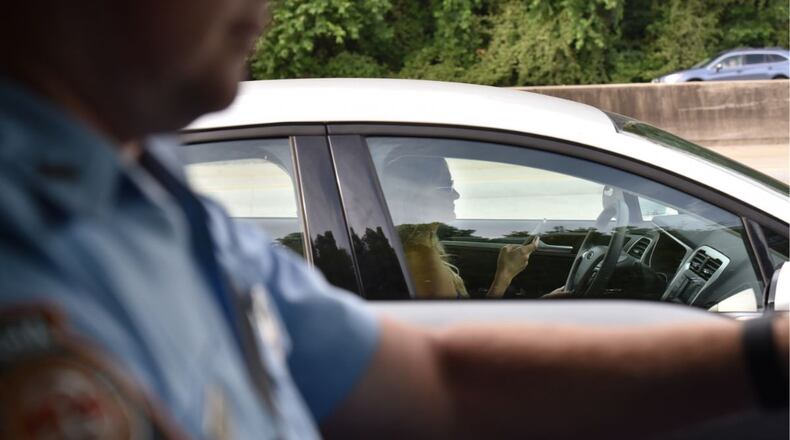Nine months after the state prohibited drivers from holding their cellphones, evidence is mounting that the new law is making a difference on Georgia roads.
Traffic tickets for distracted driving are up. Fatalities are down. Surveys suggest most residents are aware of the law and trying to comply — though imperfectly. And this week an analysis found Georgia motorists are spending less time on their phones.
There are still plenty of people ignoring the new law. And safety advocates say it will take more than a year before its full impact is clear. But Robert Hydrick, a spokesman for the Governor’s Office of Highway Safety, said he’s encouraged by the early evidence.
“It’s a transition period. What we’re trying to do now is show people why it’s in their best interest to drive alert,” Hydrick said. “Whatever is going on in that phone is not as important as the lives of other people on the road. It’s just not.”
Experts say distracted driving is a leading cause of traffic fatalities nationwide. According to AAA, drivers who text are up to eight times as likely to be involved in a crash.
With motorists' eyes glued to their phones, people are paying with their lives. Traffic fatalities in Georgia rose by one-third from 20014 to 2016 before declining slightly to 1,549 in 2017.
That death toll was on the minds of state lawmakers when they passed the Hands-Free Georgia Act.
The law, which took effect in July, prohibits motorists from handling phones and other electronic devices while driving. You can still talk, play music and otherwise use the devices — but you must use hands-free technology.
After giving motorists time to get used to the new rules, the Georgia State Patrol cracked down on distracted driving late last year. Troopers issued 8,389 distracted-driving citations in the second half of 2018 — more than double the 3,827 issued for comparable offenses in the first half of the year.
They issued an additional 7,077 citations in the first three months of this year. A first offense costs $50.
“Some people, it’s just not going to hit them until it hits them in their pocket,” State Patrol Sgt. 1st Class Stephanie Stallings said.
Stepped-up enforcement and publicity about the law seems to have captured the public's attention. An analysis released this week found Georgia drivers spent less time texting and using apps behind the wheel after the law took effect.
TrueMotion, the firm behind the study, tracks cellphone data for insurance companies. It analyzed the behaviors of more than 21,000 Georgia drivers who agreed to have their cellphone use electronically monitored. It tracked them for three months before and four months after the new law took effect.
Before the law took effect, Georgia drivers texted or used apps 19.5 percent of their time behind the wheel.
“In other words, for every hour on the road, Georgians were typing or swiping on their phones nearly 12 minutes,” the analysis found.
But distracted-driving behaviors fell to 15.4 percent of total driving time after the law took effect — a 21 percent decrease.
TrueMotion’s findings may not precisely reflect changing behavior among all Georgia drivers. But Marketing Director Matt Fiorentino said the sample size for the analysis is large, and it likely signals a wider decrease in drivers’ cellphone use.
“It may not be 21 percent for the entire population — it could 15 percent or 25 percent — but the amount of change we’ve seen suggests a downward trend in distraction,” he said.
Recent surveys also found Georgians are paying attention to the new law, if not always obeying it.
In January, an Atlanta Journal-Constitution survey found 45 percent of respondents said they obeyed the law all the time, and an additional 40 percent said they did most of the time. A AAA survey released last week found 77 percent of Georgians were aware of the law.
Perhaps most importantly, traffic fatalities have fallen. Preliminary statistics from the Georgia Department of Transportation show 1,515 people died in state traffic accidents in 2018 — down 2.2 percent from the previous year.
Early statistics from 2019 also are encouraging. So far this year, 342 people have died in Georgia traffic accidents — down 7 percent from the same period last year.
But plenty of drivers are still fiddling with their phones. The AAA survey found more than 60 percent of respondents see people driving with phones in their hands.
East Cobb resident Chris Dusack often commutes by bike to the Medical Center MARTA station. He estimated that 1 out of 10 drivers he sees is on his or her phone — and even more at stoplights.
“When the light turns green, I notice that cars don’t go right away,” Dusack said. “I look down, and they’re looking in their lap.”
It’s also unclear whether drivers who have put down their phones will stick with it. TrueMotion reported that other states have seen a similar reduction in distracted driving after new laws passed — only to see the gains evaporate “when the hype dies down.”
Hydrick said a full picture of the law’s impact may not come until fall 2020, after two full years have passed. But he thinks targeting driver behavior — which causes the overwhelming majority of fatal crashes — is the right approach.
“If you can eliminate the bad behavior,” he said, “we can save thousands of lives in this country every year.”
Stay on top of what’s happening in Georgia government and politics at www.ajc.com/politics.
About the Author
Keep Reading
The Latest
Featured




